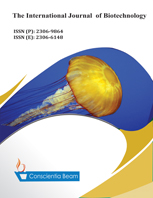Proximate, Mineral Composition and Microbial Counts of Over-Ripe Fried Plantain (Dodo-Ikire) Sold By Vendors in Ikire Town, Nigeria
Abstract
There are increasing reports of food poisoning due to methods used for processing certain food items in most parts of Africa especially in Nigeria. Also, very scanty information is available on the nutritional status and microbial counts of over-ripe fried plantain (Dodo-ikire) locally produced among the indigenes of Ikire Town and sold in some parts of Western States of Nigeria. This experiment reports the proximate, minerals and microbial counts of over-ripe fried plantain as affected by vendors in three different markets in Ikire Town, Osun State, Nigeria. Samples were obtained from four vendors each in three different markets namely: Total Station Market (TSM1-TSM4), Oja Ale Market (OAM1-OAM4) and Gbongan Garage Market (GGM1-GGM4). Among the samples obtained in TSM, the crude protein of sample TSM1 (4.16%) is not statistically different from the control (4.59%) but higher (p<0.05) than other treatments. The total ash of sample TSM2 (1.53%) and TSM3 (1.51%) were lower (p<0.05) compared with other samples. In the market coded OAM; the crude fat of sample OAM2 (15.4%) is significantly higher (p<0.05) compared to the value obtained for control and other samples, while total carbohydrate ranged from 66.81 to 76.64%. The results obtained for crude fibre ranged from 1.69% to 2.55%. The bacterial counts of dodo ikire purchased from four vendors in Total Station Market indicated that the samples coded TSM1 (8.0cfu/g) and TSM2 (9.0 cfu/g) had higher (p<0.05) bacterial counts compared with samples purchased from all the vendors in the selected market and the control sample. Samples TSM2 and TSM3 had the same level of fungal counts (3.0cfu/g) which differed significantly (p<0.05) from the values of sample TSM1 (4.0cfu/g). Among the samples obtained from vendors in Gbongan Garage Market, it is observed that the crude protein of samples GGM1 (3.53%), GGM3 (3.54%) and GGM4 (3.94%) were not significantly (p<0.05) different but lower compared with the value (4.59%) of the control. The range of values obtained for minerals were Sodium (21.089-44.437mg/kg), Potassium (16.345-17.432mg/kg), Calcium (3.567-5.005mg/kg), Magnesium (1.842-2.776mg/kg), Phosphorus (5.026-5.263mg/kg), Copper (0.000-0.004mg/kg), Iron (0.075-0.246mg/kg), Manganese (0.023-0.034mg/kg) and Zinc (0.002-0.004mg/kg). The sodium content (44.437mg/kg) of sample TSM is significantly (p<0.05) higher compared with samples from other markets and the control, while the values of potassium, phosphorus, manganese and zinc were not significantly (p<0.05) difference among the treatment samples from the markets and the control. The study concluded that the observable increase in fat, which results from the addition of palm oil; which is a major source of cholesterol to the over ripe plantain could pose deleterious effect on susceptible person consuming foods containing high cholesterol. The significantly higher values of microbial counts obtained in the samples purchased from some of the vendors compared with control sample which was prepared in the laboratory indicated poor hygiene practices by the vendors. From the result of microbial counts, it is suggested that improvement be made on preparation practices and that better choice of dodo ikire packaging material could also help to minimize microbial contamination. Finally, it was suggested that hawking in densely populated areas of the town should be discouraged to minimize microbial contamination of the final dodo ikire product during distribution and marketing.

